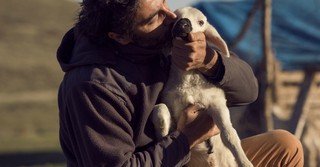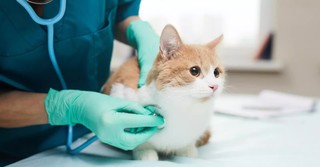What Does the Bible Say about Caring for Animals?
Share

Our nine-month-old standard poodle showed me what “sick as a dog” means. I called my husband to give the vet’s report. “Max will die if we don’t do surgery.”
“A righteous man is kind to his beast. Do the surgery,” he said.
When I said “I do” to Larry, I couldn’t have foreseen all the times his character would impact my life—even to how we treat our pets. Proverbs 12:10 says, “The righteous care for the needs of their animals, but the kindest acts of the wicked are cruel.” Kindness to animals is godly. In fact, caring for them is part of our purpose.
“Then God said, ‘Let us make mankind in our image, in our likeness, so that they may rule over the fish in the sea and the birds in the sky, over the livestock and all the wild animals, and over all the creatures that move along the ground’” (Gen. 1:26).
God made us in His image “so” that we might take care of the animals. Could it be that as image bearers we most reflect God when we tend His creatures? Adam, the first man, spent his first day on earth working with God naming the animals.
“Now the Lord God had formed out of the ground all the wild animals and all the birds in the sky. He brought them to the man to see what he would name them; and whatever the man called each living creature, that was its name. So the man gave names to all the livestock, the birds in the sky and all the wild animals” (Gen. 2:19-20).
Imagine how fun it was for God to introduce Adam to the various members of His creation. I’m sure they shared lots of laughs as Adam came up with names. “Let’s call the one with the funny nose a ‘rhinoceros.’”
Photo credit: ©Getty Images/Eva Blanco
God’s Care for Animals Shows His Love for Us

We care for our animals the way God cares for us and for them. His care is recorded throughout Scripture.
“You, Lord, preserve both people and animals” (Ps. 36:6).
The rainbow is God’s promise to both humans and animals that He’ll never destroy the earth by flood again. One reason God relented from destroying wicked Nineveh was to save the animals.
“And should I not have concern for the great city of Nineveh, in which there are more than a hundred and twenty thousand people who cannot tell their right hand from their left—and also many animals?” (Jonah 4:11).
God points to His care of wild birds to remind us we can trust Him to care for our needs.
“Therefore I tell you, do not worry about your life, what you will eat or drink; or about your body, what you will wear. Is not life more than food, and the body more than clothes? Look at the birds of the air; they do not sow or reap or store away in barns, and yet your heavenly Father feeds them. Are you not much more valuable than they?” (Matt. 6:25-26).
How Should We Care for Animals?
Caring for our animals has taught me much about God’s love and care for me. Does the Bible tell us how to care for our animals? The psalmist described the Lord as his shepherd. Let’s look at the example the Lord models in Psalm 23.
“The Lord is my shepherd, I lack nothing.
He makes me lie down in green pastures,
he leads me beside quiet waters” (Ps. 23:1-2).
The Lord anticipates our needs and provides for them. He supplied food for Adam, Eve, and the animals before He created them. Pet owners and those who care for wildlife need to provide consistent care for the animals that rely on them. If we start feeding wild birds, we shouldn’t stop during ice storms. They’ve learned to depend on us.
Our animals need clean water and proper nutrition. They look to us to supply these. It is hard to resist a playful kitten or cuddly puppy. But we must consider the long-term commitment of caring for a pet before we bring that baby animal home or start to put out birdseed. And we must not delegate a pet’s well-being to a child that is too young to shoulder that responsibility.
Photo credit: ©Getty Images/Mahiruysal
We Care for Their Emotional Needs

“He refreshes my soul” (Ps. 23:3).
Our assortment of pets has included such animals as Chinese Fighting fish, a Rhode Island Red chicken, a white duck, a guinea pig, and various cats and dogs. Each one has displayed a unique personality. Animals don’t have spirits like humans, but they have souls. They display affection, grief, joy, jealousy, fear, pride, and playfulness. They’ve moped or withdrawn when they felt left out. And danced when they’ve been included in something they enjoyed.
Our chicken and duck learned they could get cheerios by scratching at a neighbor’s screen door. The chicken would run to greet my husband when she heard his car arrive home from work. He’d pick her up and gently toss her in the air. She loved it.
When Jordan, the duck, was a duckling, she followed our son around like he was her mother. We tried to release her at a friend’s pond after she’d grown up, but she wouldn’t leave us. So we brought her back home to her kiddy pool.
When my husband was in seminary, we rented a house with indoor/outdoor carpet. At night I’d sit on the dining room floor and let our guinea pig run through the dining chair legs. He’d circle round and stop in front of me to be sure I was watching. His contented squeaks and stops before me let me know he enjoyed the play and interaction with me.
Our Chinese Fighting fish would swim to the surface of his small fishbowl to have his back scratched by our cat’s sandpapery tongue when he lapped water. Max, our male standard poodle, pranced and whimpered in joy when we brought home a new puppy. Seven years later when she died, grief threw him into a health crisis.
We care for our animals when we acknowledge their emotional needs. Their little souls need play, love, comfort, and attention just like we do. Some animals, like our standard poodles, also require exercise and intellectual stimulation.
Photo credit: ©Getty Images/FamVeld
We Protect Them from Harm

“He guides me along the right paths for his name’s sake” (Ps. 23:3).
Jesus taught us to pray, “And lead us not into temptation, but deliver us from the evil one” (Matt. 6:13). That prayer reminds us we need His help to navigate safely through this world. Our animals need guidance and protection too.
Some human foods like dark chocolate and grapes are toxic for dogs and cats. It’s our job to keep them out of their reach. Some animals have coats that require grooming, or they will mat or block their vision. Those who live by busy streets need a physical or invisible fence to protect their animals.
“Even though I walk through the darkest valley,
I will fear no evil, for you are with me;
your rod and your staff, they comfort me” (Ps. 23:4).
The company of the Lord is a great comfort when we feel afraid. Our presence and rules can comfort our pets too. They feel secure when they know we’re in charge.
One of our dogs was afraid of thunderstorms. Another one feared loud vacuum cleaners when he was a puppy. We recognized their stress and comforted them with our closeness.
“You prepare a table before me in the presence of my enemies.
You anoint my head with oil; my cup overflows” (Ps. 23:5).
Just as a good shepherd tends the wounds, insect bites, and illnesses of his sheep, we must provide protection and care for our animals when they suffer. One of our dogs has two autoimmune diseases. This means we must give him a monthly shot and a daily dose of prednisone. We apply essential oils in the summer to ward off insects.
Photo credit: ©Getty Images/AnnaStills
We Enjoy Them

Our animals’ needs provide opportunities to interact with them and build special bonds. In our family we have different roles. Our daughter does the evening walk. My husband does a morning walk. I feed them. My son throws the ball when he gets home. They look forward to their special times with each of us.
“Surely your goodness and love will follow me all the days of my life,
and I will dwell in the house of the Lord forever” (Ps. 23:5).
When we invest in our animals, they give back to us. Each pet brings out a different aspect in us.
Two weeks after we lost our seven-year-old female dog last year, my husband said, “We need a new spirit in this house. Let’s look at puppies.”
God provided a joy boy for us. He was not Cosette, but he brought a different kind of joy to our home.
My friend lost her son in a tragic car wreck. There were days she couldn’t move. And yet her puppy would make her laugh, even when she didn’t want to. That dog became therapy for her and helped her make it through the first thirteen years after her son’s death.
Our animals are gifts from God. Mine have shown me how to better trust God by how they trust me. In caring for them I’ve come to appreciate how much God cares for me. It brings me joy to see them happy. That reminds me that I bring God joy when I enjoy all He does for me. When they appreciate my care, I want to let my Shepherd know how much I appreciate Him.
How do we care for our animals? Notice how your heavenly Father cares for you and pass it on.
Related articles
Do Dogs Go to Heaven?
Why Does Jesus Care so Much about His Lost Sheep?
Bible Verses about Animals
Photo credit: ©Getty Images/fizkes
Debbie W. Wilson is an award-winning author, Bible teacher, and former Christian counselor who speaks and writes to connect fellow sojourners to the heart of Christ. Her books include Give Yourself a Break, Little Women, Big God, and Little Faith, Big God.
She and her husband lead Lighthouse Ministries, a non-profit Christian counseling and Bible teaching ministry. Despite time in Boston, the Midwest, and Southern California, Debbie still says y’all. Her family, which includes two mischievous standard poodles, calls North Carolina home. Connect with Debbie, find free resources, and learn about her books at debbieWwilson.com.